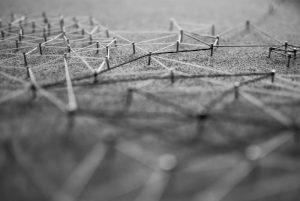We are now challenged with scale and complexity unprecedented in our species’ history. Never before have we had to face such an interconnected array of problems as what we are going to talk about. Human welfare and security is at grave risk.
The challenges that we now face lie far beyond the problem-solving abilities of any individual, any political party, country or any existing institutions.
Just to grasp its significance, we have to get out of our silos and use systems thinking.
But this is something we are not at all equipped to do. Neither our cognitive capacities, social organizations, nor our scientific trainings have prepared us to confront these issues.
Driven at the core by exponential population growth, here is a brief rundown on the mix of threats we face:
- First, the rampant destruction and toxification of the biosphere is accelerating. The climate has been destabilized. Wildlife is in dramatic decline. Biodiversity is plummeting. Wetlands, forests, soils, the oceans, the rivers are all coming under increasing stress.
- Second, the depletion of fossil fuels is rapidly approaching a critical point. We’ve entered an era where incomes, energy return and energy per capita are declining even for the ‘richest’ countries in the world. In spite of all the talk about renewable energy, there is no replacement in sight for diesel fuel, jet fuel or gasoline. The vital role of cheap, plentiful and powerful liquid fuels is something we constantly fail to acknowledge. Without them, there will be less mobility, less trade, less buildings, less industry and much less food.
- Third, we face increasing scarcities of fresh, clean water, metal ores, minerals and other essential resources. We have to use increasingly more fossil energy to continue even the same level of access that we currently depend on.
- Finally, and perhaps most importantly, due to the way in which our brains evolved we remain in the iron grip of myths, values and ideologies developed for living in small groups. Our instincts apply to an era of abundant resources and scarce humans. They don’t help us cope with this era of abundant humans and scarce resources.
Under the combined weight of all these problems – and, keep in mind, they interact with and reinforce each other – the share of what is available to each of us is rapidly shrinking. Ecological, economic and political support services are dwindling worldwide at a time when these services are needed more than ever- simply because there are more and more of us every day. We are at a point where environmental and humanitarian problems converge.
We already see crumbling economies and social security systems leading to the rise of demagogues, to more migrations and to more injustice. In times of economic and social stress the human mind defaults to fear and anger; to the demonization of “out-groups”, and to the breakdown of societal trust and ties. Armed to the teeth, we are disturbingly close to nuclear war.
Ultimately, the interconnected dimension of ecological, economic and societal failure increases the likelihood of a deepening spiral of collapses, a final assault on nature, and a massive loss of life.
So it’s no wonder that there is a broad – though still largely unarticulated – hunger for processes of real change.
However, addressing all of these challenges together requires an unprecedented level of collaboration.
Countless initiatives have been attempted—locally, regionally… some even globally. However, conventional organizations typically become mired in bureaucracy and lose sight of their goals as they grow.
They don’t work because as their group size grows they rely more and more on what “feels right” for them to be doing. But what “feels right” to us is a by-product of our small-group, tribal primate thinking pattern that was so perfectly adapted to our life as hunter-gatherers that we were for most of our history.
So, today, faced with the gigantic combination of challenges, people still myopically focus on parts of the problem, more research, temporary fixes… and ignore the whole!
But to address the whole, we first have to see the whole. That’s where the FAN comes in.
To bring in the Big Picture. Grounded in facts. Informed by diverse areas of knowledge. An essential first step to building a shared understanding.
With that, we can more easily identify and then focus on addressing root causes of our central problems. And only then, develop solutions that make sense.
In addition to redefining the problems we face by applying new frames of reference, the FAN is also bringing unprecedented approaches to communications.
We know that while the facts are important, to reach disparate audiences we have to emphasize the context of that information.
The FAN shifts the focus from fragmented individual efforts to actively co-creating a desirable common future, regardless of political affiliations, cultural backgrounds or geographical location.
We know that collective wisdom cannot be manufactured or built into any plan in advance. Outcomes cannot be choreographed. There can’t be any one “theory of change” because the scope and the dynamic of the unprecedented problems are on too grand of a scale.
The FAN offers a space in which people connect with a core group of issues; where it is possible to ask deeply probing questions, and to articulate bold visions. A space where people can honestly explore options that lie beyond the standard ways of thinking and our current societal narratives.
It is not about the next ten or fifty years, which is all that most organizations talk about, but the next thousand years and beyond.
Many believe it is too late to avert a system-wide crisis and so there is no point in doing anything. Others believe technology is going to save us. Absolute positions in both camps just cause apathy. The truth probably lies – as usual – in the middle. This is where the FAN operates.
To take all reasonable steps to steer systems to produce the most desirable possible outcome, encourage public discussion of choices that lie ahead, soften the blows for as many as feasible, and to save what we truly cherish.


